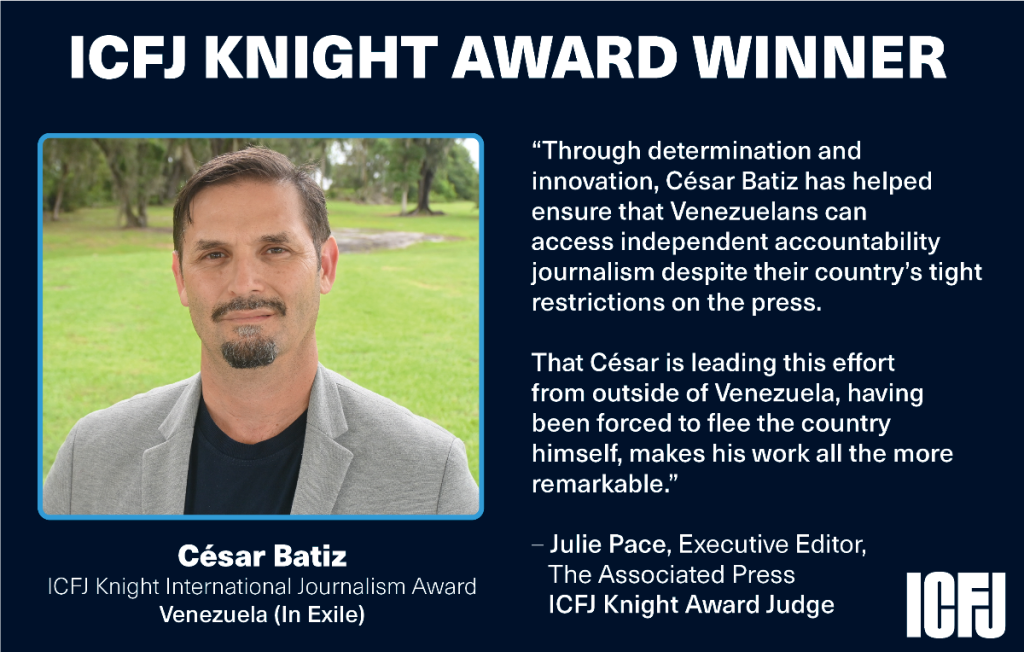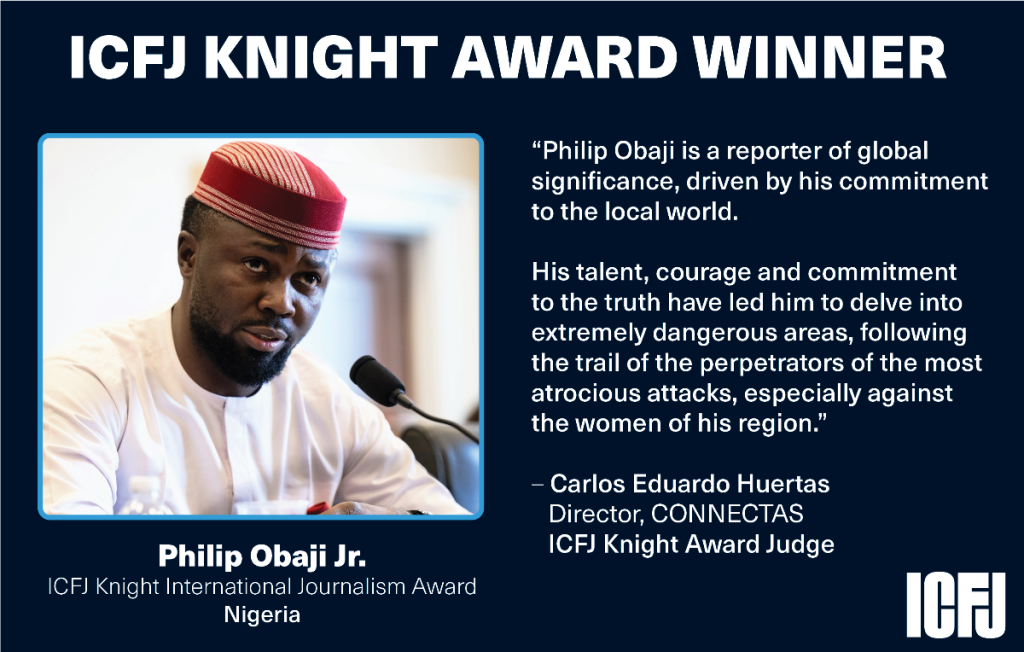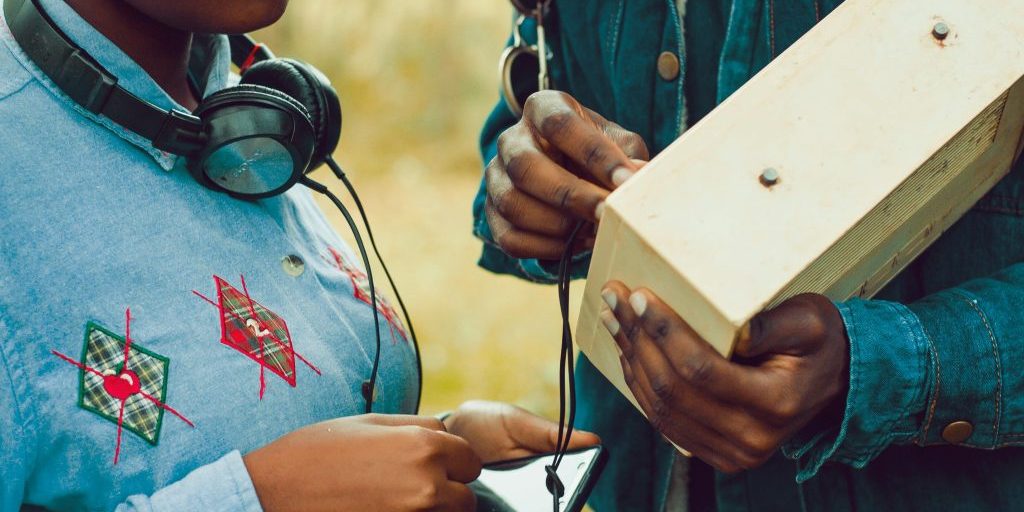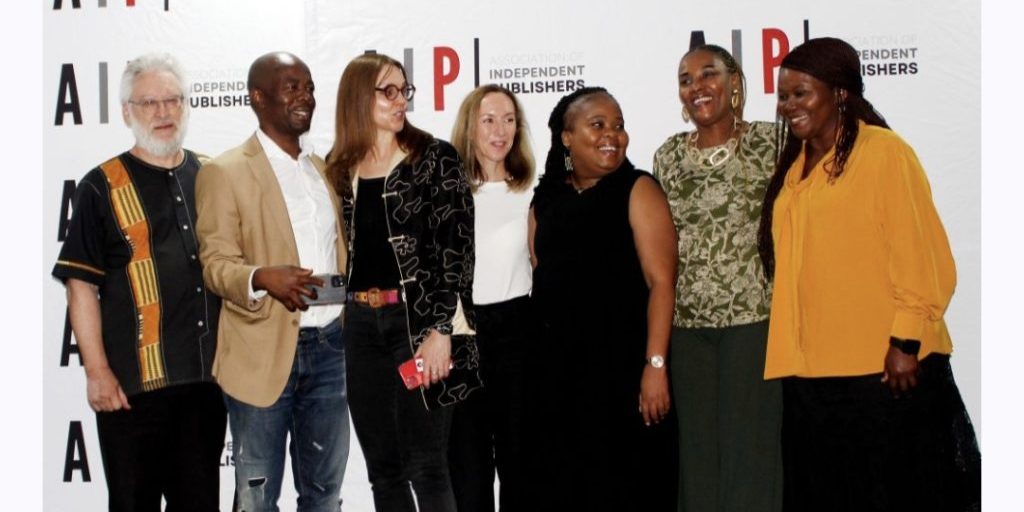ICFJ Knight International Journalism Award winners bravest of the brave
PICTURE: Philip Obaji Jr, a Nigerian journalist who has documented Russian atrocities in Central and West Africa as a correspondent for The Daily Beast and other outlets
The International Center for Journalists
The ICFJ today announced its 2025 Knight Award winners – two journalists who have demonstrated exceptional courage and perseverance in exposing wrongdoing in environments that are incredibly hostile to the press.
The awardees are: César Batiz, an investigative journalist in exile who is the co-founder and director of the pioneering El Pitazo in Venezuela, and Philip Obaji Jr, a Nigerian journalist who has documented Russian atrocities in Central and West Africa as a correspondent for The Daily Beast.
The two winners will be honoured on 13 November at the ICFJ Awards Dinner, along with NBC News’ Lester Holt, who will receive the ICFJ Founders Award for Excellence in Journalism, as announced in April.
Abby Phillip, who anchors CNN’s NewsNight with Abby Phillip, will serve as the emcee.
‘This year’s winners have shown a remarkable ability to surface the truth despite powerful entities working to suppress it,’ ICFJ President Sharon Moshavi said.
‘César and his team at El Pitazo reach Venezuelans with independent news, circumventing censorship through innovative means. Half a world away, Philip is documenting Russia’s often brutal activities in Africa as it taps the continent’s natural resources to help fund its war against Ukraine’
The ICFJ Knight Awards are supported by the John S and James L Knight Foundation. The winners were selected by a panel of judges made up of leading news executives, past ICFJ award winners and other distinguished members.
‘It’s imperative that we recognise the work of journalists who advance the public’s understanding of critical issues around the world, especially when that work is carried out in challenging environments,’ said Marisa Kwiatkowski, Director for Journalism at the Knight Foundation.
‘Safeguarding journalists is essential to upholding press freedom.’
About the winners

The trailblazing outlet, El Pitazo (The Whistleblower), uses a variety of creative means to reach people in a shrinking democratic space, including theatre performances, innovative use of WhatsApp and a reporting network of 1 400 citizens.
Batiz is a Venezuelan investigative journalist and media leader whose news organisation has pioneered innovative methods to bypass government censorship in one of the world’s most restrictive media environments.
Amid ongoing efforts to silence him and his media outlet, Batiz and his team have helped define how journalism can operate under authoritarianism by leveraging technology and involving citizens in the reporting process
Batiz co-founded El Pitazo in 2014 to deliver critical information and investigations to Venezuela’s poorest and most remote communities. Over more than a decade, the independent outlet has employed nearly 500 journalists and become one of the most innovative in the region, despite regular threats.
Its website has been repeatedly blocked by Internet providers and targeted by cyberattacks, while its reporters have faced physical and online attacks, been denied access to public events and threatened with legal action.
When state-controlled Internet providers first blocked El Pitazo, Batiz led the technology team that developed mirror pages so that audiences could continue to access their journalism – a solution that other Venezuelan media later adopted.
Batiz and his team, including co-founders Javier Melero and Gustavo Alemán, also developed initiatives like InfoCiudadanos, which has trained over 1 400 citizens to gather and distribute information in their areas.
The programme gives people the tools to become news sources and contributors, creating a network that has become an integral part of El Pitazo’s news gathering and distribution strategies
Now operating from exile after numerous threats against him, Batiz continues to lead El Pitazo‘s unique approaches to journalism, including WhatsApp-based news delivery and discussion forums, performative journalism through theatre and music, and community workshops with experts.
He also co-founded strategic alliances, like the Alianza Rebelde Investiga with outlets Runrunes and TalCual, that pool resources to produce and share news more widely.
El Pitazo produces hard-hitting investigations. In collaboration with five other outlets in Venezuela and Mexico, they published ‘Mujeres en la vitrina’ (Women in the Showcase), a cross-border investigation into the sex trafficking of Venezuelan migrant women that inspired a Netflix miniseries and won the 2019 Gabo Award in Innovation.
Prior to El Pitazo, Batiz worked as an investigative reporter and editor at the media house, Cadena Capriles. His investigative work has had significant impact. For example, after his investigation into the Venezuelan state-owned oil company’s purchase of a subsidiary, more than 20 Venezuelans were prosecuted in the United States.
Under Batiz’s leadership, El Pitazo has won multiple prestigious international awards, including the 2019 Ortega y Gasset Award and the Premio Rey de España de Periodismo with an alliance of Venezuelan media.

Obaji Jr is the foremost journalist reporting on massacres, rape, torture and other abuses by Russian paramilitaries, primarily in the Central African Republic (CAR) and Mali. In the course of his reporting, Obaji has been abducted and beaten, and he regularly faces threats
The government-contracted forces are fighting rebels in exchange for access to minerals and other commodities – in part to help fund Russia’s war in Ukraine.
Since 2018, the Nigerian journalist has documented as many as 100 instances of abuse by the Wagner Group and its successor, Africa Corps, primarily in the CAR and Mali.
Obaji has interviewed dozens of survivors on the ground in refugee camps, mining villages and elsewhere – reporting that requires great care and that has led to him being abducted and assaulted
Obaji is a correspondent for The Daily Beast based in Nigeria. A longtime freelancer, he has reported for Al Jazeera, The Guardian and USA Today, among other outlets. In 2023, he was selected as an inaugural recipient of the ICFJ Jim Hoge Reporting Fellowship.
Obaji has provided some of the most detailed, and heartbreaking, accounts of Russian paramilitary forces committing violence – often relayed by women and children survivors.
For one article, he spoke to dozens of witnesses in Bouar, CAR, who told him that the ‘white soldiers’ had drugged, raped and administered contraceptives to hundreds of young women since February 2021, when the town was recaptured from rebels.
In 2024, Obaji testified in Washington, DC, before the Commission on Security and Cooperation in Europe – an independent commission of the United States federal government – drawing attention to Russia’s often obscured operations in Africa. He also spoke of his harrowing experience on a reporting trip in CAR, where government forces arrested and beat him and rebels later held him for hours.
Obaji is the winner of the 2024 Homo Homini Human Rights Award, the 2023 One World Media International Journalist of the Year award, and the 2022 Jaime Brunet International Prize.
In addition to reporting on Russian paramilitary forces, he has reported on jihadism, human trafficking and other human rights issues in sub-Saharan Africa.
Obaji began his journalism career as a college student in 2004, working as a talk show host on Cross River Broadcasting Corporation (CRBC) TV in Nigeria.
- In partnership with tech powerhouse Code for Africa, ICFJ has launched a global initiative called ICFJ+ that connects journalists, technologists, civil society and others to produce and share vital information that people can use to better understand the world and act constructively to shape it




